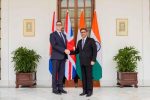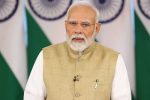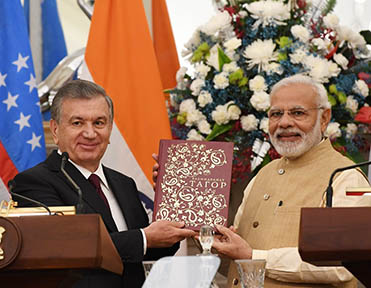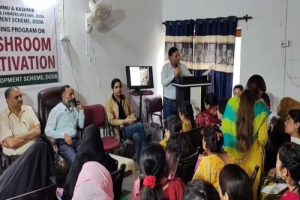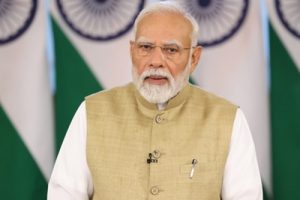India and Uzbekistan set an annual bilateral trade target of $1 billion to be achieved within two years and agreed to boost connectivity as the two sides signed 17 agreements across a range of sectors following delegation-level talks led by Prime Minister Narendra Modi and Uzbekistan President Shavkat Mirziyoyev here on Monday.
The two sides also agreed to further strengthen their Strategic Partnership which will be a boost to India’s increasing engagements with Central Asia.
“We have agreed to strengthen trade and investment ties and have set a bilateral trade target of $1 billion by 2020,” Modi said in a joint address to the media with Mirziyoyev following the the talks.
“We have also decided to start negotiations for a preferential trade agreement,” he said.
India-Uzbekistan bilateral trade stands at around $350 million now and the new target represents a six-fold increase over this.
Modi also said that India has decided to extend a line of credit (LoC) of $200 million to Uzbekistan for housing and other social infrastructure projects.
“Apart from this, we will welcome Uzbekistan’s proposals under $800 million line of credit and buyer’s credit from Exim Bank,” he said.
“We have proposed to help Uzbekistan in the areas of space, human resource development and information technology.”
Modi said that in Monday’s talks, they discussed ways to boost connectivity.
In this connection, he stressed on the importance of Chabahar port in Iran that is jointly being developed by India, Iran and Afghanistan.
He also expressed gratitude to Uzbekistan for its support in India becoming a member of the Ashgabat Agreement, which seeks to establish an international transport and transit corridor between Iran, Oman, Turkmenistan and Uzbekistan, earlier this year.
“We are happy that Uzbekistan has agreed to be a part of the International North South Transport Corridor (INSTC),” he said.
The INSTC is a 7,200-km-long multi-modal network of ship, rail and road routes for moving freight between India, Iran, Afghanistan, Armenia, Azerbaijan, Russia, Central Asia and Europe.
Modi said that during the talks, both sides shared their vision and plans to further strengthen the Strategic Partnership that they share.
The India-Uzbekistan relationship was elevated to that of a Strategic Partnership during the visit of then Uzbek President Islam Karimov to India in 2011.
“Meaningful discussions were also held on regional issues of importance that are linked to our security, peace, prosperity and cooperation,” Modi said.
He said that both sides also agreed to deepen cooperation in the Shanghai Cooperation Organisatin (SCO) and other international forums.
India was made a member of the SCO, a Eurasian inter-governmental organisation, last year.
In terms of defence cooperation, the Prime Minister said that India and Uzbekistan discussed joint military exercises and military education and training among other areas.
Stating that both India and Uzbekistan seek a secure and prosperous external environment, he said that a stable, democratic, inclusive and prosperous Afghanistan will be beneficial for the whole region.
“We also discussed issues of e-visa, tourism, academic exchanges and air connectivity,” Modi said.
On his part, Mirziyoyev said that the India-Uzbekistan Strategic Partnership is very important for Tashkent’s foreign policy.
He said that Uzbekistan supports India’s bid for permanent membership in the UN Security Council.
“We discussed the fight against terrorism, extremism, and narcotics trafficking,” the Uzbek President said.
“We are very concerned about the conflict in Afghanistan and feel that the only solution is a dialogue between the Afghan government and the opposition.”
Following the talks, 17 agreements were signed between the two sides, including in the areas of tourism, military training, law and justice, agriculture, science and innovation, health, and pharmaceuticals.
Earlier in the day, Mirziyoyev was accorded a ceremonial welcome at the Rashtrapati Bhavan here.
External Affairs Minister Sushma Swaraj also called on the visiting dignitary and discussed cooperation in trade and investment, development cooperation, education, renewable energy, connectivity and tourism.
The Uzbek President arrived here on Sunday on his first official visit to India since assuming office in 2016.


